Atlantic Monthly Contributors's Blog, page 184
April 21, 2016
The Growing Cost of North Carolina's HB2
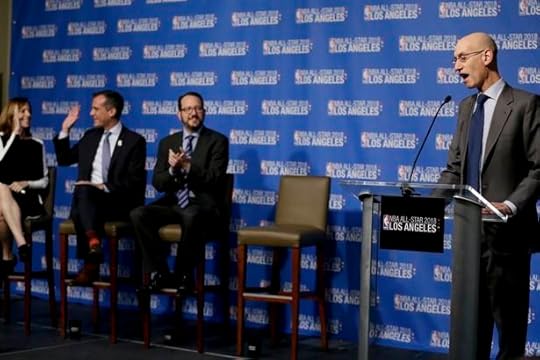
Adam Silver, the league’s commissioner, made his comments with reporters on Thursday.
Adam Silver says the NBA has been clear that if the status quo in North Carolina remains in place the All-Star Game would have to be moved.
— Tim Bontemps (@TimBontemps) April 21, 2016
Among other things, HB2, as the measure is officially known, bars government from establishing or mandating transgender bathroom accommodation. The blowback against the decision prompted North Carolina’s governor to announce some tweaks, but that hasn’t prevented companies from announcing boycotts of the state, musical acts canceling concerts, and, now, the NBA’s decision to move the All-Star Game if the law remains in effect.

Volkswagen's Redemption Tour

Volkswagen has agreed to repair or buy back nearly 600,000 vehicles it sold in the United States that were equipped with illegal software that evaded U.S. emissions standards.
A U.S. district judge in California announced the agreement Thursday between the German automaker and the U.S. Justice Department, the Environmental Protection Agency, and the California Air Resources Board. The decision comes six months after the EPA and the California agency discovered Volkswagen had manipulated engines of its “clean diesel” cars so they released emissions at EPA-approved levels in test settings but spewed 40 times the levels allowed while on the road. Volkswagen has admitted to selling 11 million vehicles with this software worldwide since 2009.
The company said Thursday:
Volkswagen is committed to earning back the trust of its customers, dealers, regulators and the American public. These agreements in principle are an important step on the road to making things right.
Volkswagen has been unable so far to offer fixes to the cars, and buying them back could cost the company billions of dollars, according to USA Today. The agreement also requires Volkswagen to invest in “green automotive” initiatives.
The deal means Volkswagen will avoid a trial in the U.S., but its troubles are far from over. The company reported its first quarterly loss in at least 15 years last October. It faces criminal investigations in the United States, Germany, and France, and has poured billions of dollars into efforts to repair its damaged global image.

A Torch Is Lit in Athens, and a Bridge Collapses in Rio
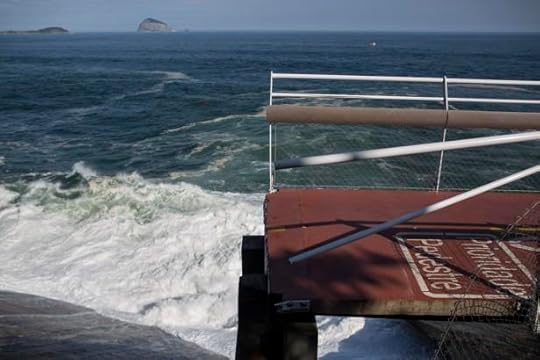
On the same day that Athens lit the Olympic flame, a bike path in Rio de Janeiro built ahead of the summer games collapsed into the ocean and killed two people. The bridge was inaugurated in January, and ran about half a mile between the beach neighborhoods of Leblon and Sao Conrado, according to the Brazilian newspaper O Globo.
A strong wave hit the bridge Thursday, and about 150 feet of the raised concrete pathway crashed to the ground. The Associated Press reported that just months after it was finished, local papers published photos showing rusted and missing handrails, even deterioration to the bridge. Although no Olympic events were supposed to be held on the pathway, it was meant to increase access to the beach, as well as to the coastline’s views.
The AP reported:
An Associated Press photographer at the scene saw two dead bodies laid out on the Sao Conrado beach. A woman thought to be the wife of one of the victims kneeled over his body, kissing his face and begging for another moment to "say goodbye."
The two dead haven't been named, but Diego Goncalves Fernandes, a beach vendor who saw the bodies floating in the water before they were fished out by a helicopter, said both were men. A crowd of beachgoers gathered around the bodies, which were laid out on the sand and covered by colorful beach sarongs.
Brazil also had construction problems when preparing for the 2014 FIFA World Cup. At least eight workers died while building stadiums, and a bridge even collapsed during the games. This isn’t a good time for Brazil to worry about shoddy construction. Not only are the games just a few months away, but Brazil’s Congress recently voted to impeach the president, Dilma Rousseff, over allegations she hid federal budget problems two years ago as she campaigned for her second term. Not to mention, people have been concerned about athletes swimming in sewage water. And, of course, there’s Zika.

Prince the Immortal
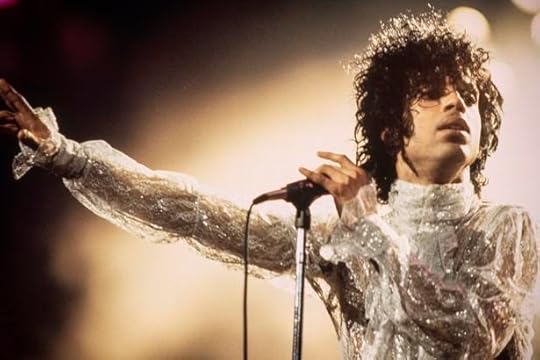
“I don’t wanna die / I’d rather dance my life away,” Prince sang on “1999,” a line that can’t help but be considered in light of the shocking news of his death at age 57. There were a few big themes in Prince’s songs, but his ongoing reckoning with mortality might explain everything else he did in his four-decade career. His work—his music, his visuals, his movies, his public comments, his business decisions—acknowledged the grimmest realities of existence and used them as inspiration for something joyful, transcendent, and weird. After reportedly struggling with epilepsy at a young age, he labored to build his own reality, one that disregarded most commonly recognized limits except for the most inescapable of them.
Which meant doing a lot of extraordinary things. It meant making his debut album, For You, at age 19. It meant wholly ignoring taboos about sexual expression in his slew of smashes through the ’80s. It meant liquidating any perceived boundaries between rock and R&B and funk and pop. It meant rebelling against the strictures of a record contract by rebelling against the strictures of a 26-letter alphabet, not to mention brand-management conventions, in renaming himself a symbol. It meant building Paisley Park, the compound in Minnesota where he lived, recorded, and now has died. It meant one of the least fashionable religious awakenings of all time. It meant continuing to buck conventional wisdom about how to distribute music in the Internet era. It meant protest songs and surprise concerts and mysterious tweets, right until the month when he died.
Coming so soon after the death of David Bowie, it’s a moment to consider how deeply important iconoclasts are to the evolution of a culture. Do they change the world by trying to change it, or do they change the world through the radical act of simply being themselves? With Prince, you got the sense, usually, that it was a self-aware version of the latter. His lifestyle changed from party-driven to puritanical over the years, but his precise personality and his flair for surprising the public never did: This was authentic uniqueness, and he indicated time and again that it was preparation for the day that has now arrived. It will go over-quoted now, but you can’t avoid thinking about the words of “Let’s Go Crazy”: “We are gathered here today to get through this thing called ‘life.’” And: “We’re all excited, but we don’t know why / Maybe it’s cause we’re all gonna die.”
Read Follow-Up Notes
Sacha remembers her first Prince concert, at age 11
His recent work—hyperactive, electronic, brash—defied most expectations for what music from an aging icon of music taking stock of their career should sound like. But the lyrics fixated even more than ever on the passage of time and the idea of feeling immortal through the joys of sex and dancing and pure sensation. Turn to “June,” a rare recent ballad and the final song of 2015’s HITNRUN Phase One, to hear him to give his philosophy in terse, moving allegory. He sings of putting pasta on the stove and then falling into a reverie about music. He wonders whether he should have lived through the Woodstock era; he admires the sound of Richie Havens on the turntable. Then, to close: “What’s that? Something burning on the stove—must be the pasta.” He knew his time, like everyone’s, would be up before he was ready for it to be. What mattered was what came before.

Remembering Prince
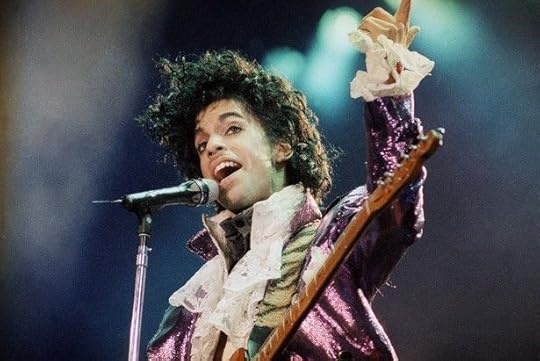
Updated on April 21 at 4:03 p.m. ET
Prince, the legendary singer and songwriter, is dead, his publicist confirmed in a statement. Prince was 57.
Here is the statement from Prince’s publicist, confirming his death. pic.twitter.com/x0bRkdMVGs
— MJ Lee (@mj_lee) April 21, 2016
Prince’s body was discovered at his compound in Paisley Park in Chanhassen, Minnesota, early Thursday. The cause of death is unknown, though Prince had been hospitalized last week. TMZ, which first reported the singer’s death, said Prince’s representatives had at the time said he’d been battling the flu.
Here’s more on his death:
Official release on Prince death from Carver County. They tried to revive him with CPR. Pronounced dead 10:07 am pic.twitter.com/n3Tz49lyHQ
— Andy Mannix (@AndrewMannix) April 21, 2016
Reaction to Prince’s death from his fellow musicians and fans was almost instantaneous:
I LOVED him, the world LOVED him. Now he's at peace with his Father. Rest in power, @prince, my brother. pic.twitter.com/ZN6cc3WWuF
— Chaka Khan (@ChakaKhan) April 21, 2016
A photo posted by Questlove Gomez (@questlove) on Apr 21, 2016 at 10:34am PDT
A purple nebula, in honor of Prince, who passed away today. https://t.co/7buFWWExMw pic.twitter.com/ONQDwSQwVa
— NASA (@NASA) April 21, 2016
Born Prince Rogers Nelson in Minneapolis on June 7, 1958, the musician became a superstar after the release in 1982 of his album 1999. But it is his iconic release Purple Rain, which came out in 1984, for which he’s probably best known. Still, as the Rock and Roll of Fame says in its biography of Prince, “the artist’s deep discography is full of funky treasure.”
Writing in The Atlantic in 2013, Elias Wright pointed out the unlikely origins of perhaps the most influential musician of his generation.
When Prince released his third album, Dirty Mind, in 1980, most people outside of Minneapolis probably did not predict the purple domination to come. A lot of the magic was right there in that album, though. It’s approximately 29 minutes of layered falsetto vocals, neck-breaking guitar licks, bursts of bass, and pounding synthesizers, all illustrating an ability to smash musical genres into one and create undeniable melodies.
But over the next decade, Prince became the face of an entire swathe of sound emanating from Minneapolis, containing numerous other funky acts, many of whom were connected with him in some way: The Time, Alexander O’Neal, Sheila E, Cherrelle, Vanity 6.
The seven-time Grammy winner sold more than 100 million albums in his lifetime, and won an Oscar in 1985 for Best Original Song Score for Purple Rain. Prince was also famously a workaholic and music-obsessive who produced nearly 40 studio albums and dozens of other recordings.
“There’s not a person around who can stay awake as long as I can,” he said in an interview in 1985. “Music is what keeps me awake.”
In 1993, he changed his name from Prince to a symbol, fusing the signs of male and female. It was during this period he came to be referred to as “The Artist Formerly Known as Prince.” He reverted to his stage name, Prince, in 2000.
“I follow what God tells me to do,” Prince said, according the Hall of Fame. “It said, ‘Change your name,’ and I changed my name to a symbol ready for Internet use before I knew anything about the Internet.”
The legendary musician was also known for his live performances, including during a downpour at Super Bowl XLI, considered one of the great halftime concerts of all time. You can watch that here:
Here’s a roundup of the significant moments from his career.
John Covach, a rock historian from University of Rochester Institute for Popular Music, in a statement called Prince “one of the most important artists in American popular music during the last two decades of the twentieth century.”
“As a performer, he challenged the limits of sexuality, in many ways paralleling Madonna’s musical exploration of suggestive behaviors and taboo topics during the 1980s,” Covach said. “He will be remembered as one of most significant artists in American popular music history.”
Indeed, my colleague Ta-Nehesi Coates, who has criticized Prince’s comments on homosexuality, called the artist “arguably the greatest pop musician of our time.” One aspect of that artistry was Prince’s ability to write about sex. As Coates explained in in 2009, Prince sang about sex “like a man honestly singing about sex.”
But Prince was never afraid of himself, or what he'd do. On the contrary, he embraced it. In a song like “Erotic City” he earns the right to say “We can fuck (funk) until the dawn,” by first saying, “Every time I comb my hair \ Thoughts of you get in my eyes,” or “All of my hang-ups are gone \ How I wish you felt the same.” He revels in the wanting, in the potential for rejection, he does not fear it.
Prince announced last month that that he would publish his memoir next year. It was tentatively titled The Beautiful Ones, after a song in Purple Rain.
“Y’all still read books, right?” he asked, according to an NPR account of the event in Manhattan, New York. Here’s more:
Just before 11:00 p.m., in a brand new outfit featuring a sky-blue pants and a furry vest, Prince was back on another part of the balcony, with an accompanying dancer. And what had previously appeared to be an electric piano and mic set-up was revealed as a DJ or a live-MPC rig. Prince pressed play on "Hot Thing," and began singing the still wonderfully grimy electro-funk cut from his 1987 album Sign O' The Times, (altering one lyric about "going to the Random House ball"), before transitioning to that album's deeply reflective title track.
For approximately the next 30 minutes, Prince took the party on a funhouse ride through his catalog, with a rapt audience trying to keep up, singing along to most every word. The artist cut up drum-machine patterns (heavy on the "Sign" beat"), while cuing up eight and sixteen-bar asides of tracks that spanned his illustrious career.
In an interview on ABC in 2010, Prince shared a lesson on professional endurance. “The key to longevity,” he said, “is to learn every aspect of music that you can.” Prince lived to be only 57, but he fulfilled the latter part of that sentiment.
You can read my colleague Spencer Kornhaber’s appreciation of Prince here.

Where Zika Could Spread Next

More than 2 billion people live in parts of the world where researchers say environmental conditions are suitable for the spread of Zika, a mosquito-borne virus that is known to cause severe birth defects in babies born to infected mothers.
A team of researchers from the United Kingdom, the United States, Canada, Australia, Sweden, Germany, and Brazil estimated in a new study this week that over 2.17 billion people on four continents live in areas at risk for transmission of the virus. Researchers say these locations have the ingredients necessary for Zika transmission: warm, humid weather, high population density, and the presence of Aedes mosquitoes, the insects that carry the virus.
Their map shows much of Latin America and virtually all of the Caribbean is at risk:

eLife;
The risk varies in Brazil, the country hardest hit by the outbreak (the paper abbreviates the Zika virus as ZIKV):
Large portions of the Americas are suitable for transmission, with the largest areas of risk occurring in Brazil, followed by Colombia and Venezuela, all of which have reported high numbers of cases in the 2015-2016 outbreak. In Brazil, where the highest numbers of ZIKV are reported in the ongoing epidemic, the coastal cities in the south as well as large areas of the north are identified to have the highest environmental suitability of ZIKV. The central region of Brazil, on the other hand, has low population densities and smaller mosquito populations, which is reflected in the relatively low suitability for ZIKV transmission seen in the map.
Researchers said the southeastern United States, from Texas to Florida, is “highly suitable for transmission,” especially as temperatures rise in the summertime. Although no cases of Zika have been reported there, some sub-Saharan African nations, the northwest region of India, and the northernmost parts of Australia may also be susceptible to Zika spread.
U.S. health officials confirmed earlier this month that the Zika virus can cause microcephaly, a condition in which infants are born with smaller-than-normal heads and neurological defects. There is no treatment or vaccine for Zika infection, but scientists around the world have fast-tracked medical research since the outbreak emerged in Brazil last year. The World Health Organization in February designated the spread of the virus a public-health emergency of international concern, the most serious action the organization can take.

Donald Trump's Case for Tolerance
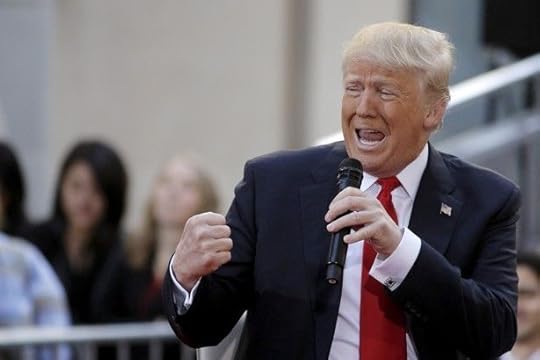
Blame it on his New York values, but Donald Trump doesn’t like North Carolina’s recently passed HB2, which—among other things—bars government from establishing or mandating transgender bathroom accommodation.
“North Carolina did something that was very strong, and they’re paying a big price, and there’s a lot of problems,” Trump said at a Today show town hall on Thursday:
One of the best answers I heard was from a commentator yesterday, saying, ‘Leave it the way it is! Right now.’ … North Carolina, what they’re going through with all the business that’s leave and all the strife, and that’s on both sides. You leave it the way it is… There have been very few complaints the way it is. People go, they use the bathroom that they feel is appropriate. There has been so little trouble. And the problem with what happened in North Carolina is the strife and economic punishment that they’re taking.
Perhaps it’s unsurprising that Trump, as a businessman, would view the issue through the lens of business impact rather than through culture war. A range of businesses have canceled plans to add hundreds of businesses in the state, and dozens more have criticized the law and expressed misgivings. The NBA spoke out against the law, but decided not to move the 2017 All-Star Game, which is planned for Charlotte.
HB2 has split the national Republican Party. Trump’s leading rival for the presidential nomination, Senator Ted Cruz, has backed the controversial law, which also bars cities from passing LBGT non-discrimination ordinances. Governor John Kasich, however, has said he probably would not have signed the law.
Related Story
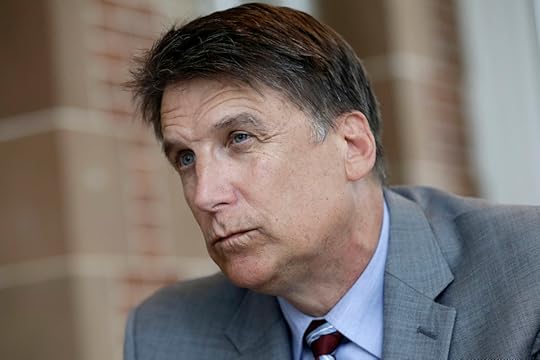
North Carolina's Nearly Meaningless Executive Order on Discrimination
Trump’s stance against the law helps highlight the gulf in the Republican Party between a more religious, socially conservative-oriented wing and the pro-business wing—and the ways Trump has transcended that gulf. On the one hand, he touts his business credentials, and in his comments on HB2, he focused on the economic impact. Yet Trump has also taken plenty of stances that are explicitly unfriendly to big business—it’s no surprise that Wall Street and corporate donors aren’t flocking to him. His fierce criticism of U.S. corporations that take jobs out of the country, and his advocacy for high (and likely illegal) tariffs stand in opposition to free-trade conservatives.
In fact, those positions represent a different sort of cultural conservatism—a method of appealing to white working-class voters who have been left behind by the economy. He’s paired that with a strong racial element, especially bashing immigrants, whether Hispanics or Arabs. But Trump has not emphasized gay-rights issues. He has generally opposed gay marriage, but has a mixed record elsewhere, and in any case has not made LGBT issues a major priority. That tack has won him the support of evangelicals across the country, and in particularly in the south—though the most religious voters still favored Cruz or other candidates. Trump is a culture warrior, but he’s a different sort of culture warrior.
North Carolina’s law was passed hurriedly in response to an ordinance in Charlotte that barred discrimination against LGBT people and required businesses to accommodate transgender people in bathrooms, with either unisex bathrooms or allowing people to use the bathroom of the gender with which they identify. The General Assembly’s bill preempted city rules on both, and required transgender people in state buildings and schools to use the bathroom corresponding to the gender on their birth certificate. (The law also preempted local living-wage laws.)
The law has created a conundrum for Governor Pat McCrory, a Republican, who is caught in the same business vs. culture war conflict. The former mayor of Charlotte, he campaigned for the governorship as a pragmatic pro-business moderate. But on issue after issue, the more socially conservative legislature has pushed him to the right. Although he declined to call a special session to consider HB2, he quickly signed the bill when it was passed.
Since then, McCrory has staunchly defended the law, including over the weekend, when he appeared on Meet the Press. McCrory is up for reelection in November, and Roy Cooper, the attorney general and Democratic nominee for governor, has opposed the law and used it to argue that McCrory and the Republicans are bad for business.
McCrory’s campaign released a statement pushing back against Trump on Thursday:
Governor McCrory has always said that North Carolina was getting along fine before the Charlotte city council passed its unneeded and overreaching ordinance. Now that it has been overturned, businesses can adopt their own policies—like Target has—instead of being mandated to allow men into women's restrooms by government. Where the governor disagrees with Mr. Trump is that bathroom and shower facilities in our schools should be kept separate and special accommodations made when needed. It's just common sense.
In an effort to tamp down criticism of the law, McCrory issued an executive order last week “clarifying” the law—mostly an effort to communicate the ways in which the law still allowed private corporations to institute the policies they wish, including creating transgender bathroom accommodations. So far, the order doesn’t seem to have quieted the backlash, as criticism of the law from companies and entertainers continues.
While McCrory doesn’t have the power to unilaterally change the law, he also called on the legislature to reinstitute the ability for North Carolinians to sue over employment discrimination of any kind, which appeared to have been removed from the law mostly accidentally. But Senate Majority Leader Phil Berger, a Republican, appears cool to the proposal—another example of McCrory’s bind. Berger also said he did not support repealing the law when the legislature returns to session next week.
But the state may yet find its hand forced. A federal appeals court in Virginia this week sided with a transgender teen in a case over bathroom accommodations, a ruling that could put billions in federal funding for North Carolina schools at risk.

The World’s ‘Largest Resettlement Effort’ for Child Refugees

The United Kingdom said Wednesday it will take in 3,000 child refugees from the Middle East and North Africa, a new program that adds to its existing plan to accept 20,000 Syrian refugees by 2020.
The U.K.’s Home Office called it the “largest resettlement effort” in the world to help children from these areas, adding it would work with the United Nations High Commission for Refugees to resettle the children. The U.K. Home Office said:
On the UNHCR’s recommendation, the scheme will not solely target unaccompanied children, but will also extend to vulnerable children at risk, such as those threatened with child labour, child marriage and other forms of abuse or exploitation. It will be open to all ‘at risk’ groups and nationalities within the region.
The U.K. has already resettled some 1,000 Syrian refugees, more than 500 of whom are children. However groundbreaking, the announcement wasn’t enough to satisfy the Liberal Democratic Party leader Tim Farron. He called it a “cynical ploy” because it would not help migrants already in European camps. He told the BBC that of the 30,000 unaccompanied migrant children already in Europe, some 10,000 had gone missing, and are feared to have been taken by human traffickers. Farron said Prime Minister David Cameron could have done much more, “and yet once again he's failed to take the opportunity.”

Curt Schilling’s Downfall

Curt Schilling once said his conservative politics were keeping him out of the National Baseball Hall of Fame. Outlandish and unapologetic, the pitcher-turned-television-analyst never shied from sharing his opinion, however unpopular they may have been. And now, he might say, it’s what got him fired on Wednesday from ESPN.
The sports network fired Schilling after he posted a meme on his Facebook page that appeared to mock transgender people, in apparent support of HB2, the controversial North Carolina law.
The post showed a man dressed as a woman over text that said, “Let him in to the restroom with your daughter or else you’re a narrow minded, judgmental, unloving, racist bigot who needs to die.”
He added on Facebook, “A man is a man no matter what they call themselves. I don’t care what they are, who they sleep with, men’s room was designed for the penis, women’s not so much. Now you need laws telling us differently? Pathetic.”
The post was cause enough for ESPN to finally cut ties with Schilling.
“ESPN is an inclusive company,” it said in a statement. “Curt Schilling has been advised that his conduct was unacceptable and his employment with ESPN has been terminated.”
For many, his firing has been a long time coming. He previously has compared Muslims to Nazis and once said Hillary Clinton “should be buried under a jail somewhere.” He has shared equally outspoken views on gay marriage, the media, and Democratic politicians.
Last August, ESPN suspended Schilling for posting the anti-Muslim meme, replacing him on Sunday Night Baseball with Jessica Mendoza, the first woman baseball announcer for the network. At the time, ESPN said Schilling’s social media posts “have obviously not reflected well on the company.”
Schilling’s Icarian downfall is in contrast to the legend he built in Boston after the “bloody sock” game in the 2004 World Series, which led to the Red Sox winning the title for the first time in almost 90 years. While his political views have long been a source of tension between him and ESPN, his personal life has hit many rough patches. Over the past decade, he lost his life savings in a failed video-game company and got cancer apparently from his years-long chewing tobacco habit.
In a 2014 interview with ESPN Boston about his cancer and debt, he said, “I brought this on myself.” In a similar vein, following the widespread criticism to his transgender post, Schilling took to his blog this week, saying, “I’m loud, I talk too much, I think I know more than I do, those and a billion other issues I know I have.”

April 20, 2016
The Fallout From the Panama Papers in Hong Kong
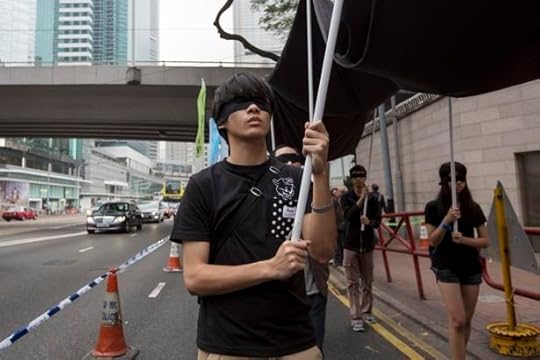
One of Hong Kong’s most prestigious newspapers has fired a top editor after the publication devoted its front page to a story about how the city’s wealthy and politically connected used Mossack Fonseca, the company at the center of the Panama Papers leak, to hold their money in offshore accounts.
The paper, Ming Pao, said it let go of Keung Kwok-yuen, the executive chief editor, to cut costs during a “difficult operational environment,” the Nikkei Asian Review, an English-language paper that covers business in Asian countries, reported. But the timing seemed to Hong Kong reporters and journalist unions as a challenge to free speech, even meddling by Beijing. Ming Pao had reported that Hong Kong elites like the city’s former chief secretary, a rich property magnate, and martial-artist movie star Jackie Chan had been implicated in the leaks.
The stories ran Wednesday morning. Ming Pao fired Kueng the same day, and shortly after unions called out the paper’s chief editor, a relatively new hire who is seen as sympathetic to Beijing. From the Nikkei Asian Review:
The union said in a statement it was “extremely angry” about the decision and believed that Chief Editor Chong Tien Siong had used cost reduction as an excuse to “punish editorial staff who have different opinions.”
…
But Ming Pao’s CEO Tiong Kiew Chiong dismissed claims that the sacking was linked to the Panama Papers report and that management was targeting particular staff members. In an interview published on the paper’s website on Wednesday evening, Tiong said turnover had fallen over the past 1.5 years and that the group had chosen to lay off Keung rather than cutting pay.
What worries Hong Kong journalists––and the people of Hong Kong––is that the Chinese government’s censorship tactics could creep into the city. Since the British returned Hong Kong to China in 1997, it has enjoyed more freedoms than the rest of the country, partly because freedom of speech and of the press were written into its bill of rights.

Atlantic Monthly Contributors's Blog
- Atlantic Monthly Contributors's profile
- 1 follower



